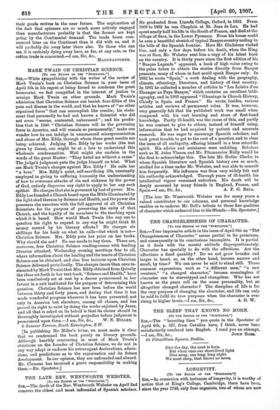THE LATE REV. WENTWORTH WEBSTER. as ma Eorros or THE
“Sraurma."] Sut,—The death of the Rev. Wentworth Webster on April 2nd removes the oldest and most influential of Spanish aoholars. He graduated from Lincoln College, Oxford, in 1852. From 1869 to 1882 he was Chaplain at St. Jean de Luz. He had spent nearly half his life in the South of France, and died at the village of Sara, in the Lower Pyrenees. From his house could be seen a beautiful stretch of typical Basque country ending in the hills of the Spanish frontier. Here Mr. Gladstone visited him, and only a few days before his death, when the King was at Sam, Mr. Webster sent him a copy of his latest book on the country. It is thirty years since the first edition of his "Basque Legends" appeared, a book of high value owing to the pains taken to obtain the stories directly from Basque peasants, many of whom in fact could speak Basque only. In 1882 he wrote "Spain," a work dealing with the geography, climate, ethnology, literature, and history of that country. In 1901 he collected a number of articles in "Lee Loiairs d'un. Etranger an Pays Basque," which contains an excellent bibli- ography, and in 1903 appeared "Gleanings in Church History, Chiefly in Spain and France." He wrote, besides, various articles and reviews of permanent value. It was, however, very generally felt that his published work was small when compared with his vast learning and store of first-hand knowledge. Partly ill-health was the cause of this, and partly he was content to give to others, instead of himself using, information that he had acquired by patient and accurate research. Ho was eager to encourage Spanish scholars, and took great trouble to get to the root of a question and to clear the issue of all ambiguity, effacing himself in a true scientific spirit. His advice and assistance were unfailing. Scholars such as Ti!, Jules Vinson and Mr. Fitzmaurice Kelly would be the first to acknowledge this. The late Mr. Butler Clarke, to whom Spanish literature and Spanish history owe so much, studied for a time under Mr. Webster, and was able to consult him frequently. His influence was thus very widely felt and his authority acknowledged. Through years of ill-health his intellectual vigour remained unbroken. His death will be deeply mourned by many friends in England, France, and [The late Mx. Wentworth Webster was for many years a valued contributor to our columns, and personal knowledge enables us to endorse Mr. Bell's tribute to those fine qualities of character which endeared him to his ftiends.—En. Spectator.]










































 Previous page
Previous page